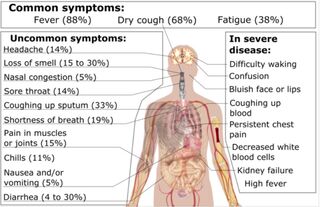Coronavirus Disease 2019
Can Melatonin Help Protect Against COVID-19?
Part 2: A new use for an over-the-counter sleep aid?
Posted May 7, 2021 Reviewed by Devon Frye
Key points
- A recent study suggests that melatonin made in the lungs may have a protective effect in preventing entry of the COVID-19 virus into tissue.
- Melatonin's role in immune responsiveness and neuroprotection have led to speculation about new uses in COVID-19.
- Clinical trials are underway to see if melatonin might help prevent infection, or decrease progression in outpatients.
This past November, I wrote about a network medicine study from the Cleveland Clinic which suggested that patients taking melatonin were nearly 30 percent less likely to test positive for SARS-CoV-2, the virus that produces COVID-19, raising the possibility that melatonin might have some protective value (1). Since then, I’ve received several inquiries about melatonin, so today’s article provides some follow-up about what has been happening in the last six months or so.

In summary, a study has found that melatonin produced in the respiratory system may be protective of infection, and there is increased understanding of the mechanisms which might be involved. There has also been speculation about the possibility of melatonin serving as an adjuvant in COVID-19 vaccines to increase effectiveness, and about its potential benefits for neurological sequelae of infection.
Finally, two clinical trials involving melatonin and COVID-19 are underway. Let’s look at each of these:
Melatonin in the Respiratory System
Much of the clinical interest in melatonin has traditionally been focused on the nightly secretion of melatonin from the pineal gland, and its effects on the suprachiasmatic nucleus (SCN) in the hypothalamus, affecting sleep and circadian rhythms. It is actually found in a number of other tissues, including the retina, GI tract, spleen, endothelial cells, and the respiratory tract (2). Melatonin can be produced, for instance, by immune system cells such as macrophages located in the nose and alveoli in the lungs.
In 2020, researchers at the University of Sao Paolo found that melatonin produced by such macrophages was involved in preventing the absorption of pollution particles in rats; when melatonin synthesis was blocked, particles were more likely to enter the bloodstream (Carvalho-Sousa et al, 2020).
Wondering whether an analogous process might take place to prevent SARS-CoV-2 infection in humans, they developed a genic measure of the lung’s ability to produce melatonin, known as the MEL-index. In a similar manner, they derived a COVID-19 signature based on the expression of genes associated with the entry of the virus into cells and subsequent intracellular processes.
They found that in human asymptomatic SARS-CoV-2 carriers, the two measures were inversely related: in other words, the greater the ability of the lungs to produce melatonin, the less the degree of viral entry into tissues. The authors suggested that this might pave the way for using the MEL-index as a way of detecting asymptomatic carriers.
Once again, this study involves a correlation, not proof that melatonin helps block entry of the virus into tissues. It is suggestive, though, because there are at least two mechanisms already known by which this might happen.
A recent review of melatonin’s potential to be a "silver bullet" for COVID-19 notes that in vitro, melatonin interacts with an enzyme (a "protease") which seems critical to viral infection. It also inhibits the messenger protein calmodulin, which in turn regulates the expression of ACE2, an enzyme in lung membranes to which the virus attaches; as such, melatonin might be an indirect inhibitor of this crucial coupling in the process of infection (3).
Other Speculative Uses of Melatonin in COVID-19
- Melatonin has been known for some time to influence antibody responsiveness; more recent data suggests that it increases the potency of vaccines for the human papillomavirus, when studied in a mouse model of HPV-associated tumors (4). It is a big step from animal studies to human clinical utility, but it raises the possibility that melatonin used as an adjuvant in COVID-19 vaccines might improve their effectiveness (3).
- Melatonin appears to have antioxidant properties, which may be involved in its protective effect on nerve tissue in animal models of ischemic stroke and neurodegeneration (5). Again, it is a big step from animal studies to human, as emphasized by the mixed results to date with melatonin use in dementia patients (5). Nonetheless, COVID-19 causes a large array of neurological complications including stroke as well as psychiatric consequences ranging from anxiety to frankly psychotic symptoms; thus the speculation that melatonin’s neuroprotective properties seen in animals might be studied for clinical utility in these situations (3).
Have There Been Any Treatment Studies as of Now?
The short answer is no. A preliminary review of medical records from Columbia University seemed to suggest that melatonin increased survival rates in COVID-19 patients who required intubation (6). It came out in the online server medRxiv.org, which provides a rapid presentation of preprints that have not been peer-reviewed and appropriately carries the caution that "It reports new medical research that has yet to be evaluated and so should not be used to guide clinical practice." As of the time of this writing, it has not yet appeared in a peer-reviewed journal, and it will be interesting to see if comes out in one which provides such scrutiny.
The good news is that there are now two treatment trials underway. One, sponsored by the University of Buffalo, involves giving melatonin to COVID-19 outpatients within 72 hours of the appearance of symptoms (7). The second, from the University Hospital of La Paz, seeks to determine whether daily administration of melatonin will be protective from infection in exposed health care workers (8).
Cautions about melatonin: As we await further information, it is important to remember the caveats about melatonin mentioned in more detail in the previous blog (1). As it is sold over-the-counter, its production is not monitored in the manner of prescription drugs, and the actual content of its OTC preparations may differ significantly from what appears on the label. It can also have adverse effects such as drowsiness, headaches, and dizziness. When taken near mealtime, it can affect the processing of glucose, causing higher blood concentrations. It can also interact with a number of medicines.
In summary, there continue to be some intriguing connections regarding melatonin and COVID-19, but they have not yet come to fruition. It is wise to keep in mind that melatonin also carries some potential downsides, and its possible use should be in consultation with a doctor.
Portions of this article are adapted from Understanding Sleeping Pills.
References
1. Zhou, Y. et al.: A network medicine approach to investigation and population-based validation of disease manifestations and drug repurposing for COVID-19 PLoS Biology, November 6, 2020. https://doi.org/10.1371/journal.pbio.3000970 See also: Cleveland Clinic Consult QD, 11/13/20: Melatonin a Promising Candidate for Prevention and Treatment of COVID-19. https://consultqd.clevelandclinic.org/melatonin-a-promising-candidate-for-prevention-and-treatment-of-covid-19/
2. Acuna-Castroviejo, D. et al.: Extrapineal melatonin: sources, regulation and potential function. Cellular and Molecular Life Sci. 16, February 2014. https://www.researchgate.net/publication/260271540_Extrapineal_melatonin_Sources_regulation_and_potential_functions
3. Cardinali, D.P. et al.: Can melatonin be a potential ‘silver bullet’ in treating COVID-19 patients? MDPI Diseases 8: 44, 2020. https://doi.org/10.3390/diseases8040044
4. Rahimi, S.B. et al.: Enhancement of therapeutic DNA vaccine potency by melatonin through inhibiting VEGF expression and induction of antitumor immunity mediated by CD8+ T cells. Arch. Virol. 163: 587-597, 2018. https://doi.org/10.1007/s00705-017-3647-z
5. Lee, J.G. et al.: The neuroprotective effects of melatonin: possible role in the pathophysiology of neuropsychiatric disease. Brain Sci. 2019 Oct; 9(10): 285. https://www.ncbi.nlm.nih.gov/pmc/articles/PMC6826722/
6, Ramlall, V. et al.: Melatonin is significantly associated with survival of intubated COVID-19 patients. MedRxiv.org, October 18, 2020. https://doi.org/10.1101/2020.10.15.20213546 Accessed May 2, 2021.
7. Clinical Trials: Safety and efficacy of melatonin in outpatients infected with COVID-19. https://clinicaltrials.gov/ct2/show/NCT04474483 Accessed May 4, 2021.
8. Clinical Trials: Efficacy of melatonin in the prophylaxis of coronavirus disease 2019 (COVID-19) among healthcare workers. https://clinicaltrials.gov/ct2/show/NCT04353128 Accessed May 4, 2021.




